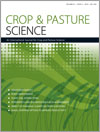Biochar has been widely proposed as a relatively novel approach to improve soil quality and increase crop productivity, but its underlying mechanisms are not well understood. A large root system in plants is either a constitutive or an inducible trait dependent on the uptake of resources and the production of shoot dry matter. Here a field experiment was conducted to investigate the effects of biochar amendment on the dynamic growth and development of maize (Zea mays L.), both above- and belowground, and to explore the relationship between soil condition, root traits and shoot biomass over two growing seasons on the Loess Plateau in northern China. Biochar was added to a maize field at rates of 0, 10, 20 and 30 t ha–1 without mulching and at rates of 0 and 20 t ha–1 with film mulching before sowing the first crop. The application of straw biochar with 30 t ha–1 decreased soil bulk density by 12% and increased soil total porosity by 13% in the 0–10-cm soil layer 6 months after biochar addition. Biochar amendment increased soil organic carbon, total soil nitrogen, carbon : nitrogen ratio, and available phosphorus and potassium at the end of each growing season. Although, root growth was inhibited at a rate of 30 t ha–1 in the early stage of the first year, biochar amendment exhibited a positive effect in other stages, resulting in higher root weight density, root length density and root surface-area density. These responses led to higher growth rates, maize biomass, grain yields and uptake of nitrogen, phosphorus and potassium as the rate of biochar addition increased. Film mulching with biochar amendment achieved the greatest root and shoot biomass and grain yield in both crops, despite differences in climate conditions. Biochar aged in the field for 2 years had the same effect on soil properties and crop production, suggesting that the application of straw biochar may be a promising option for increasing productivity in semi-arid farmland.
How to translate text using browser tools
31 May 2016
Soil amendment with biochar increases maize yields in a semi-arid region by improving soil quality and root growth
Qian Xiao,
Li-Xia Zhu,
Hong-Pei Zhang ,
Xiu-Yun Li ,
Yu-Fang Shen,
Shi-Qing Li
ACCESS THE FULL ARTICLE

Crop and Pasture Science
Vol. 67 • No. 5
May 2016
Vol. 67 • No. 5
May 2016
Biochar
dry matter accumulation
film mulching
nutrient levels
root traits




